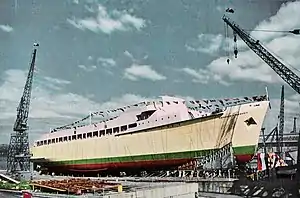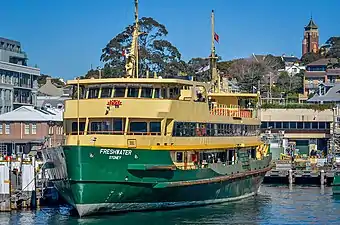State Dockyard
The State Dockyard was a ship building and maintenance facility operated by the Government of New South Wales in Carrington, Newcastle, New South Wales, Australia between 1942 and 1987.
 | |
| Industry | Ship building |
|---|---|
| Predecessor | Government Dockyard |
| Founded | 1942 |
| Founder | Government of New South Wales |
| Defunct | 1987 |
| Fate | Closed |
| Headquarters | , Australia |
| Owner | Government of New South Wales |
History
In 1942, the State Dockyard opened on the site of the Government Dockyard at Dyke Point in Newcastle that had closed in 1933. Officially the New South Wales Government Engineering & Shipbuilding Undertaking, it was universally referred to as the State Dockyard. The dockyard facility was located at Carrington on Newcastle Harbour, on 11 ha (27 acres) of land in addition to the ship repairs site on 3 ha (7 acres).[1][2]
The dockyard launched its first vessel in July 1943. By the end of World War II, it had launched two ships for the Royal Australian Navy and 22 vessels for the United States and had repaired six hundred ships.[1]
With the cessation of large scale shipbuilding, in the 1970s it diversified into other engineering disciplines. In November 1986 a team of apprentices from the Hunter Valley Training Company completed a three-year overhaul of steam locomotive 3801 at the dockyard.[3] The dockyard closed on 3 March 1987.[1]
A 15,000 ton floating dock was located at Carrington in 1943 to repair damaged ships during World War II. The floating dock was scrapped in 1977 and replaced with a new one built in Japan called Muloobinba, which was eventually sold overseas in 2012.
Ships built

- HMAS Strahan (1943)[4]
- HMAS Condamine (1944)[5]
- SS Dorrigo (1946)
- SS Dubbo (1947)
- SS Delungra (1947)
- SS Denman (1949)
- MV Dongarra/Kabbarli (1950)
- SS Townsville (1952)
- MV Woomera (1952)
- MV Wangarra (1953)
- MV Warringa/Windarra (1953)
- MV Kooleen (1956)[6]
- MV Koojarra (1956)
- MV Iranda (1957)
- MS Princess of Tasmania (1959)[7]
- MV Bass Trader (1961)
- MV Cape Don (1962) Lighthouse supply vessel
- Dredge John Main (1962) For NSW Public Works.
- MV Cape Moreton (1963) Lighthouse supply vessel
- MV Moresby (1963) For Burns Philp to and from New Guinea
- HMAS Moresby (1963)[8]
- MV Cape Pillar (1964) Lighthouse supply vessel
- MV Kooringa (1964)
- MT BP Endeavour (1967)
- MT BP Enterprise (1968)
- MV Australian Trader (1969)[9]
- MV Darwin Trader (1970)
- Dredge Geopodes (1971) For a Dutch Dredging company.
- Dredge WD Resolution (1971) For Westminster Dredging company.
- MV Lysaght Endeavour (1973)
- MV Lysaght Enterprise (1973)
- MT Express (1974) For Howard Smith
- MT John Hunter (1975) For Caltex
- MV Bass Trader 11 (1976)
- MV Flinders Range (1976)
- MV Selwyn Range (1977)
- MV Freshwater (1982)
- MV Queenscliff (1983)
- MV Narrabeen (1984)
- MV Collaroy (1988)
- Lady-class ferries
After closure

In 2007 the outline of the painted "STATE DOCKYARD" sign on southern roof of the former dockyard building could still be viewed from above.
Surviving ships
As of 2014, the surviving State Dockyard built ships are Cape Don, a lighthouse tender built in 1962 for the Commonwealth Lighthouse Service which is now a museum ship at Balls Head Bay, Waverton. The ferry Freshwater continue to operate for Transdev Sydney Ferries. Queenscliff was decommissioned on October 13 and has been stored ever since.[13] Former Sydney Harbour ferries Lady Cutler and Lady McKell operate as cruise boats on Port Phillip.[14][15]
Lady Herron is laid up in Newcastle.
References
- "State Dockyard Newcastle". State Records. Government of New South Wales. Archived from the original on 21 June 2014.
- "Timeline". Newcastle Port Corporation. 2003. Archived from the original on 6 May 2008.
- "Re-Commissioning 3801" Railway Digest January 1987 page 30
- Gillett, Ross (1983). Australian & New Zealand Warships 1914-1945. Lane Cove: Doubleday Australia. p. 168. ISBN 0 86824 095 8.
- Gillett, Ross (1986). Australia's Navy Past, Present & Future. Brookvale: Child & Henry. p. 52. ISBN 0 86777 178 X.
- MV Kooleen Archived 27 February 2016 at the Wayback Machine Ferries of Sydney
- Plowman, Peter (2004). Ferry to Tasmania: A Short History. Dural: Rosenberg Publishing. pp. 100–101. ISBN 1 877058 27 0.
- Gillett, Ross (1977). Warships of Australia. Sydney: Rigby. p. 268. ISBN 0 7270 0472 7.
- Sharpe, Richard (1991). Jane's Fighting Ships. Coulsdon: Jane's Information Group. p. 31. ISBN 0 7106 0960 4.
- Andrews, Graeme (1975). The Ferries of Sydney. Terry Hills: AH & AW Reed. pp. 58–59. ISBN 0 589 07172 6.
- "Lady Street names her namesake" The Sydney Morning Herald 9 May 1979
- "Lady Herron". Ferriesofsydney.com. Archived from the original on 14 April 2015. Retrieved 8 April 2015.
- "Sydney Ferries Fleet Facts | Transport for NSW". Transport.nsw.gov.au. 15 April 2014. Archived from the original on 12 April 2015. Retrieved 7 April 2015.
- "Melbourne Showboat and Boat Cruise for Parties and Wedding". Lady Cutler. Archived from the original on 16 April 2015. Retrieved 7 April 2015.
- "History". victoriastar.com.au. Archived from the original on 29 February 2016. Retrieved 7 April 2015.
External links
- Miramar Ship Index - fuller, though incomplete, production list (subscription required)
- Flickr gallery